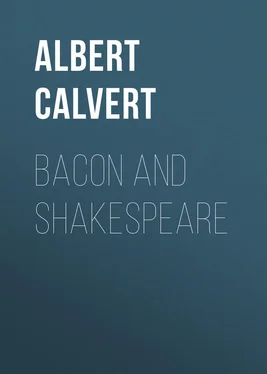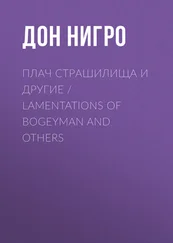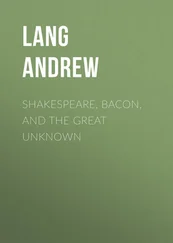Albert Calvert - Bacon and Shakespeare
Здесь есть возможность читать онлайн «Albert Calvert - Bacon and Shakespeare» — ознакомительный отрывок электронной книги совершенно бесплатно, а после прочтения отрывка купить полную версию. В некоторых случаях можно слушать аудио, скачать через торрент в формате fb2 и присутствует краткое содержание. Жанр: foreign_antique, foreign_prose, на английском языке. Описание произведения, (предисловие) а так же отзывы посетителей доступны на портале библиотеки ЛибКат.
- Название:Bacon and Shakespeare
- Автор:
- Жанр:
- Год:неизвестен
- ISBN:нет данных
- Рейтинг книги:5 / 5. Голосов: 1
-
Избранное:Добавить в избранное
- Отзывы:
-
Ваша оценка:
- 100
- 1
- 2
- 3
- 4
- 5
Bacon and Shakespeare: краткое содержание, описание и аннотация
Предлагаем к чтению аннотацию, описание, краткое содержание или предисловие (зависит от того, что написал сам автор книги «Bacon and Shakespeare»). Если вы не нашли необходимую информацию о книге — напишите в комментариях, мы постараемся отыскать её.
Bacon and Shakespeare — читать онлайн ознакомительный отрывок
Ниже представлен текст книги, разбитый по страницам. Система сохранения места последней прочитанной страницы, позволяет с удобством читать онлайн бесплатно книгу «Bacon and Shakespeare», без необходимости каждый раз заново искать на чём Вы остановились. Поставьте закладку, и сможете в любой момент перейти на страницу, на которой закончили чтение.
Интервал:
Закладка:
Bacon and Shakespeare Contrasted
The argument of the Baconians – the term is uniformly employed here to mean the supporters of the Baconian theory of the authorship of Shakespeare – is based on the honest belief that the varied qualifications necessary for the production of the Plays were possessed by only one man of the period in which they were written. And having resolutely determined that the man could be no other than Francis Bacon, they set themselves to work with the same resoluteness, to bend, twist, and contort all facts and evidence to suit their theory. It is clearly impossible to credit any of Shakespeare’s contemporary dramatists with the authorship, because their acknowledged work is so immeasurably inferior to his, that any such suggestion must appear ridiculous. It is safe to assume that no writer who had produced poems or plays inferior to those of Shakespeare could be attributed with the authorship of these plays – Shakespeare can only be compared with himself. And the only author who cannot be compared, in this way, to his instant discomfiture, is Bacon, whose published work is, in form and style and essence utterly dissimilar from that of Shakespeare. If a brilliant intellect, wide knowledge, and classical attainments were the only requisite qualifications for the production of the greatest poetry of the world, then Bacon’s claim would stand on a sure foundation. He was intimately acquainted, no man better, with the philosophy of the law; he was an eminent classical scholar, a writer of beautiful English, compact in expression, and rich in fancy. He had an extensive acquaintance with literature and history, he was a brilliant orator; but unto all these great gifts was not added the gentle nature, the broad sympathy and knowledge of humanity, the wealth of humour, the depth of passion, the creative power of poetry, which is so strikingly manifested in the plays of William Shakespeare.
Our knowledge of the gentleness of Shakespeare’s nature, his uprightness, his honesty, his modesty, is disclosed in his poems, and corroborated by the evidence of his contemporaries. His poetry breathes the gentleness and the lovable nature with which his personal friends credited him. What is there in any analysis of Bacon, beyond his marvellous mental attainments, which single him out as the probable, even possible, creator of King Lear, Brutus, Juliet, Rosalind, and Shylock? Coldness of heart, and meanness of spirit, are faults of temperament which cannot, by the greatest stretch of imagination be associated with the author of Lear’s desolating pathos and Arthur’s deeply pathetic appeal to Hubert. The points in Bacon’s career, which have been dealt with in the foregoing pages, were selected of malice prepense ; not to detract from the greatness of the Lord Chancellor, as a literary genius and philosopher, but as demonstrating the impossibility of associating such a nature with the authorship of the poetry attributed to him. By his deeds we know him to have been a man whose nature was largely made up of ingratitude, untruth, flattery, meanness, cruelty, and servility. His treatment of Essex, of Cecil, and of Yelverton, can only be stigmatised as “peculiarly cold-blooded and ungrateful;” his persecution of Peacham convicts him of cruelty, bordering on savageness; his meanness is illustrated by the selfish unreasonableness displayed by his attitude towards Trott, his long-suffering creditor. His servile submission to Buckingham has scarcely a parallel in English history.
Deep as was his mind, and profound his knowledge, Bacon possessed no high standard of virtue or morality; he had no intuitive knowledge of mankind, and even as regards his dealings with the people amongst whom his life was passed, he evidenced a singular defectiveness as a reader of character. The sweeping generalities of his observations would be a poor stock-in-trade for a writer of melodrama. In his books he exhibits the cunning, the casuistry and unscrupulousness of an Elizabethan politician and time server. His advice and his opinions betray a mean view of life and its obligations. He had no sense of duty towards his fellow men where duty clashed with his personal interests. His methods are instinct with craft, artifice, and finesse – his advice to Essex, and to the King, was, for this very reason, misleading and abortive. It is incontrovertible that Bacon’s writings and Shakespeare’s plays are crammed with all kinds of erudition, and Coleridge has claimed for the latter that they form “an inexhaustible mine of virgin wealth.” But not a single argument can be advanced to show that Shakespeare could not easily have acquired such erudition and scholarship as the writing of the plays entailed, while we have all the books of Bacon to prove that the poetic genius, the colossal personality, the deep, intense appreciation of nature, and the unrivalled knowledge of man, which are the sovereign mark of the Plays, were not possessed by Bacon.
In editing the existing biographies of Lord Bacon to bolster up their theory, the Baconians have only conformed to the laws of absolute necessity. The cold, unvarnished facts that have been set forth in the foregoing pages are so contrary to the popular impression of what constitutes a “concealed poet,” that a more than ordinary amount of colorisation was required to make them acceptable in the author of The Tempest . But although there is reasonable excuse, and even some justification for this rose-colorisation process as applied to Bacon – for great men have almost invariably been given, by their biographers, the greatest benefit that be derived from all doubts – the champions of Bacon have far exceeded their prerogative in their attempts to defame and belittle Shakespeare. So much incorrect deduction, so much groundless suspicion, and so much palpable inaccuracy have been put forward by the Baconians, that it is imperative the few known facts in the poet’s life should be clearly stated. The following sketch is frankly intended, not so much to support the claim of Shakespeare as the author of the Plays, as to refute the many misconceptions and untruths by which his enemies have endeavoured to traduce him.
Baconian Fallacies Respecting Shakespeare
It is only necessary to read the facts concerning Shakespeare’s ancestry and parentage to dissipate some of the absurd suggestions as to the obscurity and illiteracy of the family. The poet came of good yeoman stock, and his forebears to the fourth and fifth generation were fairly substantial landowners. John Shakespeare, his father, was at one period of his life a prosperous trader in Stratford-on-Avon. He played a prominent part in municipal affairs, and became successively Town Councillor, Alderman, one of the chamberlains of the borough, and auditor of the municipal accounts. The assertion that he could not write is a distinct perversion of fact, as “there is evidence in the Stratford archives that he could write with facility.”
On the subject of the education of William Shakespeare it is inevitable that there should be conflicting opinions. Those who would deck out the memory of Bacon with the literary robe, “the garment which,” according to Mr. R. M. Theobald, is “too big and costly” for the “small and insignificant personality” of Shakespeare, will not concede that he was better educated than his father, who – the error does not lose for want of repetition – “signed his name by a mark.” Supporters of the traditional theory, however, reply, “we do not require evidence to show that he was an educated man – we have his works, and the evidence of Ben Jonson, John Heming, and Henry Condell to prove it.” Mr. Theobald argues that because there is no positive proof that he had any school education, it is logical to conclude that he had none. Mr. A. P. Sinnett, with the same reckless disregard for facts, says, “We know that he (William Shakespeare) was the son of a tradesman at Stratford, who could not read or write.” And in another place, “there is no rag of evidence that he (William Shakespeare) ever went to school.” Mr. W. H. Mallock describes him, still without “a rag of evidence” to support his assertion, as “a notoriously ill-educated actor, who seems to have found some difficulty in signing his own name.” All evidence we have to guide us on this point of Shakespeare’s schooling is that he was entitled to free tuition at the Grammar School at Stratford, which was re-constituted on a mediæval foundation by Edward VI. As the son of a prominent and prosperous townsman, he would, for a moral certainty, have been sent by his father to school (Mr. Sidney Lee favours the probability that he entered the school in 1571), where he would receive the ordinary instruction of the time in the Latin language and literature. The fact that the French passages in Henry V.
Читать дальшеИнтервал:
Закладка:
Похожие книги на «Bacon and Shakespeare»
Представляем Вашему вниманию похожие книги на «Bacon and Shakespeare» списком для выбора. Мы отобрали схожую по названию и смыслу литературу в надежде предоставить читателям больше вариантов отыскать новые, интересные, ещё непрочитанные произведения.
Обсуждение, отзывы о книге «Bacon and Shakespeare» и просто собственные мнения читателей. Оставьте ваши комментарии, напишите, что Вы думаете о произведении, его смысле или главных героях. Укажите что конкретно понравилось, а что нет, и почему Вы так считаете.












